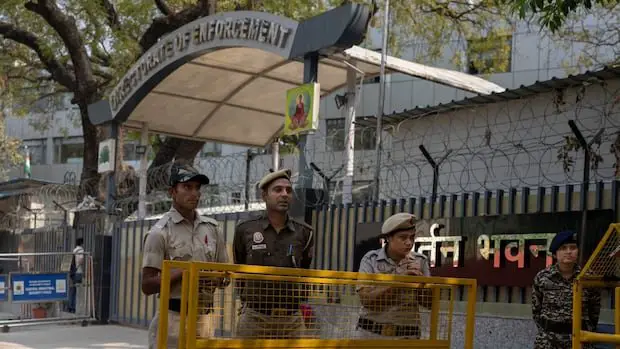An investigation by Indian officials alleges dozens of Canadian colleges and universities may be linked to a plot Illegal transport of students across the Canada-US bordershows the “astonishing” extent to which loopholes in the immigration system can be exploited, some experts say.
“If the allegations are true, it exposes shocking gaps in our integrity protocols…that is deeply concerning and problematic,” Raj Sharma, a Calgary-based immigration lawyer, told CBC News Network, adding that the allegations are “far-reaching” about people smuggling.
The Indian law enforcement agency said in a press release on Tuesday that it had discovered evidence of human trafficking between two “entities” in Mumbai after investigating the Indian connection to it the Patel familywho froze to death in January 2022 while trying to cross the border from Manitoba into Minnesota in freezing weather conditions.
The Enforcement Directorate said its investigation revealed that about 25,000 students were expelled from one institution, with over 10,000 students being expelled from another institution to various colleges outside India every year.
According to the Enforcement Directorate, arrangements are being made for the Indian nationals to get admission in Canadian colleges and universities and apply for student visas.
But once the Indian nationals reached Canada, instead of joining the college, they illegally crossed the border from Canada to the US and the fee received from the Canadian schools was transferred back to the individuals’ account, the Enforcement Directorate said.
India alleges that dozens of Canadian colleges are working with human traffickers in India to help people get to the United States. The allegations come from Indian law enforcement following their investigation into the death of a family on the Manitoba-U.S. border.
The investigation also found that around 112 colleges based in Canada had entered into an agreement with one company and more than 150 with another company, the Enforcement Directorate said.
The allegations have not been proven in court and India has not identified the Canadian universities allegedly involved.
RCMP have contacted India
Camille Boily-Lavoie, an RCMP spokeswoman, said in an email to CBC News that she has been in contact with India through her international police liaison officers to obtain additional information about the investigation.
Colleges and Institutes Canada, a national advocacy group for Canada’s post-secondary education network, said it did not have details about the type of colleges reportedly implicated in the Indian allegations.
The process of issuing and accepting study permit applications is managed entirely by Immigration, Refugees and Citizenship Canada (IRCC), the student applicant and the post-secondary institution, said Dayna Smockum, spokesperson for Ontario’s Ministry of Colleges and Universities.
“The Department of Colleges and Universities has no role in this process,” Smockum said in an email to CBC News. “As our government has done repeatedly, we continue to call on the federal government to adopt stronger border control measures to protect Ontario, our institutions and all of Canada.”
In an email to CBC News, IRCC said it has been focused on strengthening the integrity of the international student program since 2023.
It says it has imposed a cap on enrollment numbers at Designated Learning Institutions (DLIs) – schools approved by a provincial or territorial government to accept international students.
IRCC says it has also required DLIs to review all admissions decisions, introduced consequences for those institutions that do not participate in student compliance exercises, and increased minimum financial requirements for study permit applicants.
The immigration system lacks control, says expert
But Kelly Sundberg, a former Canada Border Services Agency officer and professor of criminology at Mount Royal University, said the system lacks oversight and is being “exploited” by transnational criminals.
“This type of fraud, the manipulation of our immigration system, has actually been going on for quite some time,” he said, noting that the number of those potentially involved is “astonishing.”
The U.S. has used biometric technologies such as facial recognition and fingerprinting when admitting immigrants for more than a decade and has all but eliminated identity fraud in its program, Sundberg said sadly.
But Canada doesn’t have the staff or technology to effectively vet documents or people, he said.
Indian law enforcement authorities allege links between numerous colleges in Canada and two “facilities” in Mumbai accused of trafficking students across the Canada-U.S. border. Criminologist Kelly Sundberg says Canada’s honor-based immigration system is exploited by transnational criminals but there is virtually no oversight or enforcement.
Sundberg said he would be “absolutely astonished” if he learned that there are colleges or universities that are actively and knowingly involved in this alleged criminal enterprise.
“But I’m not at all surprised that we’re seeing people, both in Canada and in the United States and abroad, coming together to take advantage of our wide-open system,” he said.
Ken Zaifman, a Winnipeg-based immigration lawyer, says in his experience the responsibility for oversight should fall on educational institutions.
“And that wasn’t the case. They were addicted to international students to fund their programs,” he said.
Colleges and educational institutions should have been aware that such a problem existed when recruiting international students, Zaifman said, but instead chose to continue using agents outside Canada to recruit students who had no control over their activities would have.
“The numbers were so significant and no one really wanted to do anything about it,” he said.
“Some universities were a little more diligent, but not all. They hired agents and recruited students, and it never occurred to them that perhaps these students’ movement wasn’t real.”
“Fly-by-night” schools
But Robert Huish, an associate professor at Dalhousie University in the department of international development studies, says he believes many of the schools involved in this alleged plan may be largely private colleges operating only in the be used at night.
“Some of these private colleges that have enabled this trade are not actually colleges. They’re abandoned offices with an outdated copy of Microsoft Word, and that’s the entire curriculum,” he said.
“The big focus here is not so much on the legitimate colleges and legitimate universities across the country, but it’s these fleeting things that pop up through gas stations.”







